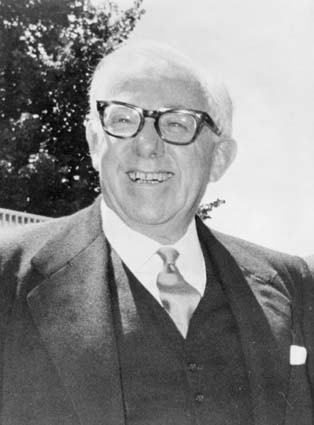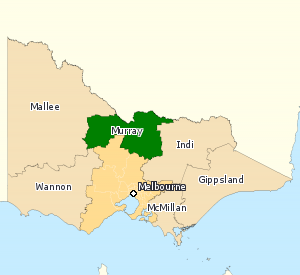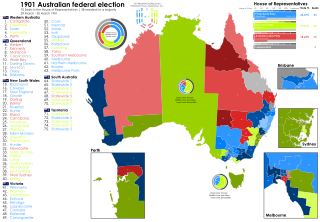
The Liberal Party of Australia is a centre-right political party in Australia. The party is one of the two major parties in Australian politics, the other being the Australian Labor Party. The Liberal Party was founded in 1944 as the successor to the United Australia Party, and has since become one of the most successful political parties in Australia's history.

John Malcolm Fraser was an Australian politician who served as the 22nd prime minister of Australia, from 1975 to 1983, holding office as the leader of the Liberal Party of Australia.
The National Party of Australia, also known as The Nationals or The Nats, is a centre-right Australian political party. Traditionally representing graziers, farmers, and regional voters generally, it began as the Australian Country Party in 1920 at a federal level.

Sir John Grey Gorton was an Australian politician who served as the 19th prime minister of Australia, from 1968 to 1971, holding office as the leader of the Liberal Party of Australia. Previously a senator for Victoria, he was the first and only member of the upper house to assume the office of prime minister.

Sir William McMahon was an Australian politician who served as the 20th Prime Minister of Australia, from 1971 to 1972, holding office as the leader of the Liberal Party of Australia. He was a government minister for over 21 years, the longest continuous service in Australian history.

The Attorney-General for Australia is the First Law Officer of the Crown in right of the Commonwealth of Australia, chief law officer of the Commonwealth of Australia and a minister of state responsible for legal affairs, national and public security. The attorney-general is usually a member of the Federal Cabinet, but need not be. Under the Constitution, they are appointed by the Governor-General on the advice of the Prime Minister, and serve at the Governor-General's pleasure. In practice, the attorney-general is a party politician and their tenure is determined by political factors. By convention, but not constitutional requirement, the attorney-general is a lawyer by training.

In Australia, electoral districts for the Australian House of Representatives are called divisions or more commonly referred to as electorates or seats. There are currently 151 single-member electorates for the Australian House of Representatives.

William Charles Wentworth, usually known as Bill Wentworth and sometimes referred to by others as William Charles Wentworth IV, was an Australian politician. He was a member of the Liberal Party for most of his career and held ministerial office in the governments of John Gorton and William McMahon, serving as Minister for Social Services (1968–1972) and Minister in charge of Aboriginal Affairs (1968–1971). Wentworth served in the House of Representatives from 1949 to 1977, representing the New South Wales seat of Mackellar. He frequently crossed the floor and served his final months in parliament as an independent.

The Division of Murray was an Australian Electoral Division in the state of Victoria. It was located in the north of the state, adjoining the Murray River, which forms Victoria's border with New South Wales. It included the towns of Shepparton, Echuca, Cobram, Yarrawonga, Boort and Bridgewater. In 2018 the division was renamed the Division of Nicholls, coming into effect at the 2019 federal election.
The following lists events that happened during 1969 in Australia.
The following lists events that happened during 1970 in Australia.

Thomas Eyre Forrest Hughes AO KC is an Australian former barrister and politician. A member of the Liberal Party, he served as Attorney-General in the Gorton government from 1969 to 1971 and was a member of the House of Representatives from 1963 to 1972, representing the New South Wales seats of Parkes and Berowra. He is a former president of the New South Wales Bar Association and was one of Sydney's most prominent barristers for a number of decades. Hughes is the last surviving Liberal minister of the Gorton and McMahon Governments.

The 1901 Australian federal election for the inaugural Parliament of Australia was held in Australia on Friday 29 March and Saturday 30 March 1901. The elections followed Federation and the establishment of the Commonwealth of Australia on 1 January 1901. All 75 seats in the Australian House of Representatives, six of which were uncontested, as well as all 36 seats in the Australian Senate, were up for election.

The politics of Australia take place within the framework of a federal parliamentary constitutional monarchy. Australia has maintained a stable liberal democratic political system under its Constitution, the world's tenth oldest, since Federation in 1901. Australia is the world's sixth oldest continuous democracy and largely operates as a two-party system in which voting is compulsory. The Economist Intelligence Unit rated Australia a "full democracy" in 2022. Australia is also a federation, where power is divided between the federal government and the states and territories.
The history of Australia from 1901 to 1945 begins with the federation of the six colonies to create the Commonwealth of Australia. The young nation joined Britain in the First World War, suffered through the Great Depression in Australia as part of the global Great Depression and again joined Britain in the Second World War against Nazi Germany in 1939. Imperial Japan launched air raids and submarine raids against Australian cities during the Pacific War.
In Australia, a redistribution is the process of redrawing the boundaries of electoral divisions for the House of Representatives arising from changes in population and changes in the number of representatives. There is no redistribution for the Senate as each State constitutes a division, though with multiple members. The Australian Electoral Commission (AEC), an independent statutory authority, oversees the apportionment and redistribution process for federal divisions, taking into account a number of factors. Politicians, political parties and the public may make submissions to the AEC on proposed new boundaries, but any interference with their deliberations is considered a serious offence.
A political family of Australia is a family in which multiple members are involved in Australian politics, particularly electoral politics. Members may be related by blood or marriage; often several generations or multiple siblings may be involved.

English Australians, also known as Anglo-Australians, are Australians whose ancestry originates wholly or partly in England. In the 2021 census, 8,385,928 people, or 33% of the Australian population, stated that they had English ancestry. It is the largest self-identified ancestry in Australia. People of ethnic English origin have been the largest group to migrate to Australia since the establishment of the Colony of New South Wales in 1788.

The Gorton government was the federal executive government of Australia led by Prime Minister John Gorton. It was made up of members of a Liberal-Country Party coalition in the Australian Parliament from January 1968 to March 1971.
This page details numerous records and characteristics of individuals who have held the office of Prime Minister of Australia.















